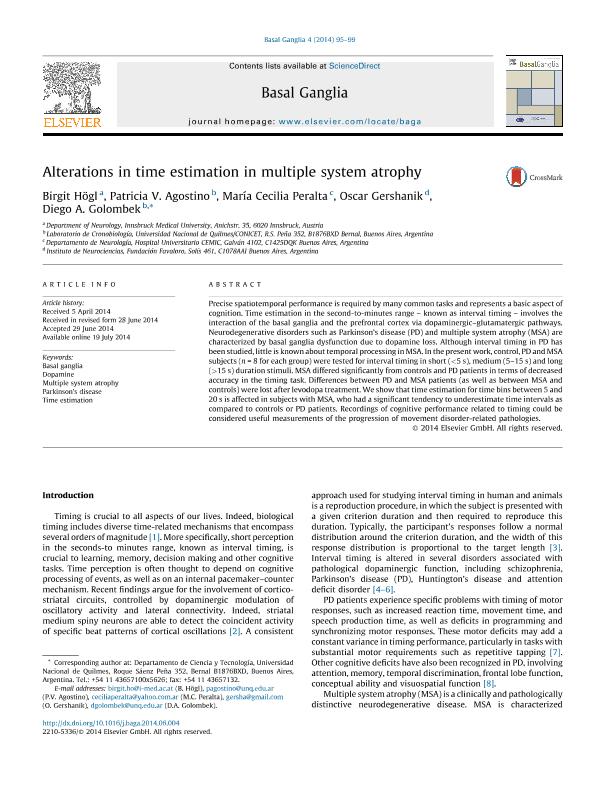Artículo
Alterations in time estimation in multiple system atrophy
Hogl, Birgit; Agostino, Patricia ; Peralta, Maria Cecilia; Gershanik, Oscar Samuel; Golombek, Diego Andrés
; Peralta, Maria Cecilia; Gershanik, Oscar Samuel; Golombek, Diego Andrés
 ; Peralta, Maria Cecilia; Gershanik, Oscar Samuel; Golombek, Diego Andrés
; Peralta, Maria Cecilia; Gershanik, Oscar Samuel; Golombek, Diego Andrés
Fecha de publicación:
06/2014
Editorial:
Elsevier
Revista:
Basal Ganglia
ISSN:
2210-5336
Idioma:
Inglés
Tipo de recurso:
Artículo publicado
Clasificación temática:
Resumen
Precise spatiotemporal performance is required by many common tasks and represents a basic aspect of cognition. Time estimation in the second-to-minutes range – known as interval timing – involves the interaction of the basal ganglia and the prefrontal cortex via dopaminergic–glutamatergic pathways. Neurodegenerative disorders such as Parkinson's disease (PD) and multiple system atrophy (MSA) are characterized by basal ganglia dysfunction due to dopamine loss. Although interval timing in PD has been studied, little is known about temporal processing in MSA. In the present work, control, PD and MSA subjects (n = 8 for each group) were tested for interval timing in short (<5 s), medium (5–15 s) and long (>15 s) duration stimuli. MSA differed significantly from controls and PD patients in terms of decreased accuracy in the timing task. Differences between PD and MSA patients (as well as between MSA and controls) were lost after levodopa treatment. We show that time estimation for time bins between 5 and 20 s is affected in subjects with MSA, who had a significant tendency to underestimate time intervals as compared to controls or PD patients. Recordings of cognitive performance related to timing could be considered useful measurements of the progression of movement disorder-related pathologies
Archivos asociados
Licencia
Identificadores
Colecciones
Articulos(SEDE CENTRAL)
Articulos de SEDE CENTRAL
Articulos de SEDE CENTRAL
Citación
Hogl, Birgit; Agostino, Patricia; Peralta, Maria Cecilia; Gershanik, Oscar Samuel; Golombek, Diego Andrés; Alterations in time estimation in multiple system atrophy; Elsevier; Basal Ganglia; 4; 3-4; 6-2014; 95-99
Compartir
Altmétricas



